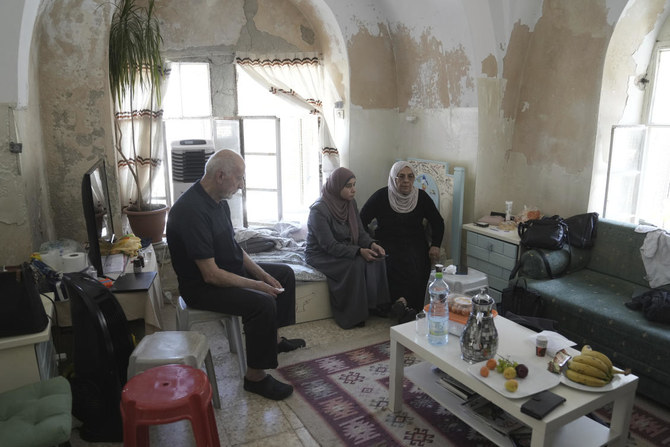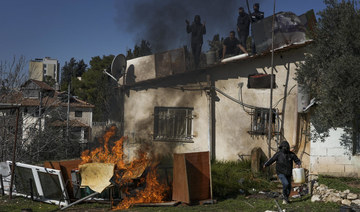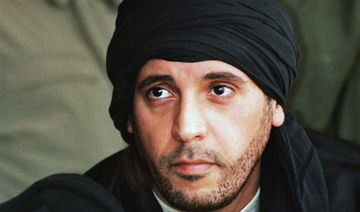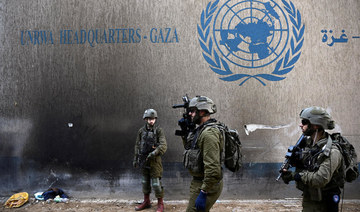JERUSALEM: Few places in Jerusalem speak of the larger conflict being waged over the city more than the apartment of 68-year-old Nora Ghaith-Sub Laban.
As the last remaining Palestinians in a building filled with Israeli settlers, the Ghaith-Sub Labans have battled Israeli attempts to evict them from their Old City home for over 45 years.
That labyrinthine legal battle ended earlier this year, when the Israeli Supreme Court struck down the family’s final motion for an appeal. Now, Israeli authorities have ordered the eviction of Nora and her husband Mustafa to take place by July 13. That includes one of the biggest holidays of the Islamic calendar, Eid Al-Adha, which began Tuesday night.
“I can’t sleep, I can’t eat,” Nora said from the apartment where she was born in 1955. From the outside, with its rough-hewed stones flattered by brilliant sunlight and its windows overlooking the golden Dome of the Rock, the 200-year-old home in the heart of the Muslim Quarter is a Jerusalem postcard. Inside, the paint has chipped and walls have peeled due to court orders barring the family from doing repairs.
In what she described as a campaign to make life so unbearable that she would simply leave, Nora said her Jewish neighbors spit and hurl stones and bottles at her. Israeli police turn up at her door, asking for IDs and demanding to know everyone who has passed in and out of her home.
“This is psychological war,” she said.
The Israeli police said the check-ins were “not meant to intimidate or harass but to gather the necessary information” ahead of the eviction.
The Ghaith-Sub Laban case is not a dispute over a single property, advocates say, but part of a wider effort by Israeli settlers, with government backing, to cement Jewish control over the contested city, especially the Old City, home to Jerusalem’s most important holy sites.
A similar dispute that could lead to evictions of Palestinian families in the nearby neighborhood of Sheikh Jarrah stirred tensions that built up to a 2021 war between Israel and the Hamas militant group in Gaza that killed over 250 people.
The family’s struggle has sparked numerous protest rallies by Israeli left-wing activists, some of which have spiraled into scuffles with Israeli police who have arrested those waving Palestinian national flags.
“It’s more than just, ‘Oh, I have this problem with my neighbor downstairs.’ You are talking about a political and national conflict,” said Yonatan Mizrahi, the settlement watch director at Peace Now, an Israeli advocacy group that opposes settlements. “What happens in the Old City does not stay in the Old City.”
Captured by Israel in the 1967 Mideast war and later annexed in a move not internationally recognized, east Jerusalem has long been a crucible in the Israeli-Palestinian conflict.
Today, more than 220,000 Jews live in east Jerusalem, largely in built-up settlements that Israel considers neighborhoods of its capital. Most of east Jerusalem’s 350,000 Palestinian residents are crammed into overcrowded neighborhoods where there is little room to build.
Across the city’s eastern half, settler organizations and Jewish trusts are pursuing court battles against Palestinian families to clear the way for settlers.
An Israeli law passed after the annexation of east Jerusalem allows Jews to reclaim properties that were Jewish before the formation of the Israeli state in 1948. Jordan controlled the area between 1948 and the 1967 war.
Nearly 1,000 Palestinians, including 424 children, currently face eviction in east Jerusalem, the United Nations humanitarian office said.
During British rule over historic Palestine, before the war over Israel’s creation, the Ghaith-Sub Laban apartment was owned by a trust for Kollel Galicia, a group that collected funds in Eastern Europe for Jewish families in Jerusalem. Its legal representative, Eli Attal, declined to comment on the case, sending only an emoji with its mouth taped shut.
Arieh King, a settler leader and deputy mayor of Jerusalem, described the Ghaith-Sub Laban family as “squatters” and the case as a straightforward real estate dispute.
“It’s Jewish property and they want it back,” he said. “(The Ghaith-Sub Labans) don’t have any right to this property.”
There is no equivalent right in Israel for hundreds of thousands of Palestinians who fled or were forced from their homes during the war surrounding Israel’s establishment to return to lost properties.
Nora’s case reflects the city’s volatile history. Hailing from the southern Palestinian city of Hebron, her parents moved to west Jerusalem in 1945, then to the Old City when the capital was divided in the 1948 war.
As residents of the same Muslim Quarter apartment for seven decades, Nora’s family gained the status of protected tenants, putting Israeli law on their side.
Nora shared with The Associated Press her Jordanian rental contract from 1953 that showed that she and Mustafa paid rent to a “General Custodian” for abandoned properties, first under Jordanian authorities and then under Israel after the 1967 war. She now pays rent — 200 Jordanian dinars, or $282 each year — to the lawyers of the Jewish trust.
The case has dragged on for decades, as the Israeli custodian and then the Kollel Galicia trust contested the family’s protected tenancy. Most recently, the Kollel Galicia endowment argued in 2019 that Nora’s absence from her house that year could clear the way for their eviction.
Nora said the house was empty at times in 2019 because she was hospitalized with a back injury and later recovered in the houses of her adult children, whom Israeli authorities had previously expelled from the Old City apartment.
Israel’s Supreme Court upheld the eviction order in late February, ending the saga that has subsumed almost her entire life and the lives of her five children. Two of her sons — Ahmad, a human rights researcher, and Rafat, a lawyer — have become full-time advocates for the case.
The Israeli police said that authorities “understand the emotions involved” but are “dedicated to upholding the rule of law” and enforcing the eviction.
Now in limbo, Nora feels her house has become a prison cell. Worried the settlers will seize on even a momentary absence to move in, she said she hasn’t stepped outside since May. Her windows — and their breath-taking view of the golden shrine — are covered with wire mesh to protect against her neighbors’ stones.
Last week, supporters and artists helped the family prepare their home for its future guests. They painted an olive tree in the living room with the words “We will remain,” written in its wild roots. There is a portrait of Nora, too, with her wire-rimmed glasses and careful smile.
“They don’t want peace, they want surrender,” she said.
As a lengthy legal battle ends, a Palestinian family braces for eviction from Jerusalem home
https://arab.news/prj58
As a lengthy legal battle ends, a Palestinian family braces for eviction from Jerusalem home

- The Ghaith-Sub Labans have battled Israeli attempts to evict them from their Old City home for over 45 years
Hamas says it ‘positively’ views Gaza Biden ceasefire proposal; EU chief also finds it to be ‘realistic'

- Hamas’ position signals a change in attitude from the group, which in recent months had accused the US obstructing attempts for a ceasefire
- Rifts between Biden and Netanyahu over red lines in Gaza has set up a potential showdown between the two leaders
GAZA: Hamas on Friday said it had a positive view of the contents of a three-phase ceasefire proposal announced by US President Joe Biden for a permanent ceasefire in Gaza.
“Hamas confirms its readiness to deal positively and in a constructive manner with any proposal that is based on the permanent ceasefire and the full withdrawal (of Israeli forces) from the Gaza Strip, the reconstruction (of Gaza), and the return of the displaced to their places, along with the fulfillment of a genuine prisoner swap deal if the occupation clearly announces commitment to such deal,” the group said in a statement.
Hamas’ position signals a change in attitude from the group, which in recent months had accused the US of siding with Israel and obstructing attempts for a ceasefire.
“Hamas sees Biden’s position now more focused on pressuring Israel to return to negotiations with a different attitude, or they (Israel) could risk clashing with the Americans,” a Palestinian official close to the mediation efforts told Reuters.
Rifts between Biden and Netanyahu over red lines in Gaza has set up a potential showdown between the two leaders, raising questions about whether the US might restrict military aid if Israel continues its offensive in the now-devastated enclave.
Prime Minister Benjamin Netanyahu’s office said that Israel had authorized negotiators to present a Gaza truce deal after Biden revealed details of the ceasefire plan.
Palestinian health authorities estimate more than 36,280 people have been killed in Gaza since Israel attacked the enclave in response to an Oct. 7 Hamas assault in southern Israel. The Hamas attack killed around 1,200 people, according to Israeli tallies.
EU chimes in
European Union chief Ursula von der Leyen also welcomed the Israeli roadmap toward a ceasefire in Gaza announced by US President Joe Biden as a “significant opportunity” to bring the war to an end.
“I wholeheartedly agree with Biden that the latest proposal is a significant opportunity to move toward an end to war and civilian suffering in Gaza. This three-step approach is balanced and realistic. It now needs support from all parties,” the European Commission president said on social media.
UN demands full aid access in Sudan

- Aid workers continue to face systematic obstructions and deliberate denials of access, committee says
GENEVA: UN agency chiefs have demanded unimpeded humanitarian access to deliver aid throughout war-torn Sudan, saying time was running out to prevent widespread famine.
In a joint statement, the heads of multiple UN agencies urged all parties in the conflict to immediately stop denying and obstructing humanitarian actions.
“Let us be clear: If we are prevented from providing aid rapidly and at scale, more people will die,” the statement from the UN Inter-Agency Standing Committee said.
“Without an immediate and major step change, we will face a nightmare scenario: A famine will take hold in large parts of the country. More people will flee to neighboring countries in search of sustenance and safety. More children will succumb to disease and malnutrition.”
The joint statement was penned by the UN aid chief Martin Griffiths, along with the heads of the UN agencies for food, health, human rights, refugees, migration, agriculture and children, among others.
The committee is the highest-level humanitarian coordination forum in the UN system, bringing together the heads of 19 organizations, some of which are from outside the UN.
Fighting in Sudan broke out in April last year between the regular army and the paramilitary Rapid Support Forces. The conflict has killed thousands and sparked a humanitarian disaster.
The statement said 18 million people were acutely hungry, 3.6 million children were acutely malnourished and famine was closing in on millions of people.
Nearly 2 million people have escaped to neighboring countries while millions more are displaced within Sudan.
FASTFACT
The joint statement was penned by the UN aid chief Martin Griffiths, along with the heads of the UN agencies for food, health, human rights, refugees, migration, agriculture and children, among others.
“Despite the tremendous needs, aid workers continue to face systematic obstructions and deliberate denials of access by parties to the conflict,” said the statement from the UN Inter-Agency Standing Committee.
“Aid workers are being killed, injured and harassed, and humanitarian supplies are being looted.”
The statement said movement across conflict lines to parts of Khartoum, Darfur, Al-Jazira and Kordofan had been all but cut off since mid-December.
The UN agency chiefs made a series of demands, including an immediate ceasefire, protection for civilians and an end to human rights violations.
“Facilitate unimpeded humanitarian access through all possible crossline and cross-border routes to allow civilians to receive humanitarian aid. Immediately cease all acts denying, obstructing and interfering with, or politicizing, humanitarian action,” they said.
“Simplify and expedite administrative and bureaucratic procedures related to the delivery of humanitarian aid.”
Jens Laerke, spokesman for the UN humanitarian agency OCHA, told a media briefing in Geneva that the conditions for aid delivery were “very, very poor, and it’s very, very dangerous.”
“We want these generals to find a way to solve their differences not by violence that kills, maims, rapes hundreds of thousands of people,” he said.
The UN also said it was concerned by limited donor support, having received only 16 percent of the $2.7 billion it needs for Sudan.
In conflict-torn Libya, artist’s family turns home into museum

TRIPOLI: A seemingly ordinary villa in the heart of Tripoli holds a lifetime of works by the late Libyan artist Ali Gana, whose family has turned his house into a unique museum.
In the North African country still grappling with divisions and conflict after the fall of Muammar Qaddafi in 2011, “art comes last,” said Hadia Gana, the youngest of the artist’s four children.
A decade in the making and with the help of volunteers, she had transformed the classic-style Tripolitan villa her father had built, before passing in 2006 at age 70, into “the first and only museum of modern art in Libya,” Gana said.
Bayt Ali Gana — “Ali Gana’s House” in Arabic — finally opened this year, and seeks to offer both retrospection and hope in a country constantly threatened by violence and where arts and culture stand largely neglected.
“It is seen as something superfluous,” Gana said, adding that galleries in the country often focus solely on selling pieces rather than making art more accessible.
Once past a lush garden, visitors reach the museum’s permanent exhibition of paintings, sculptures and sketches by the masterful Ali Gana.
Other rooms include temporary exhibitions, and offer space for seminars and themed workshops.
Set on a wall, an old shipping container houses an artist residency for “curators and museologists” whose skills are scarce in Libya, said Hadia Gana.
Libyan artists had long been subject to censorship and self-censorship under Qaddafi’s four-decade rule, and “we could not express ourselves on politics,” recalled Gana, 50, a ceramic artist.
Art “must not have barriers,” she said, proudly standing in the family-owned space for artistic freedom.
Bayt Ali Gana appears timeless, though the villa bears some signs of the unrest that followed the overthrow and death of Qaddafi.
A road sign riddled with bullets hangs from the gate that separates the museum from the private residence.
Mortar shells turned upside down sit among flowers in the garden, where visitors are offered cold drinks or Italian espressos in a setting that replicates Cafe Said, once owned by Ali Gana’s father in the old medina of Tripoli.
During the unrest that began in 2011, Hadia Gana said she feared “losing everything if a rocket hit the house.”
Then came the idea of creating a museum in the hopes of conserving her father’s precious works and archives.
Sporadic fighting, water or electricity cuts, and forced isolation due to the Covid pandemic have piled challenges on the family’s mission, while the Ganas steered clear of state funding or investors to maintain the independence of their nascent institution.
Gradually, the house morphed into a cultural center celebrating Ali Gana’s calling to “teach and educate through art,” said his daughter.
It “is not a mausoleum,” but a hub of creativity and education, she said.
Gana’s archives also document traditional crafts and trades, some of which have completely disappeared by now.
After taking power in a 1969 coup, Qaddafi had imposed a ban on all private enterprise, and “for 40 years, crafts became an outlawed activity,” said the late artist’s oldest son Mehdi, who now lives in the Netherlands.
He said that in his lifetime, Ali Gana took on a mission to “build archives in order to link Libya’s past to a possible future.”
It is “the nature of the family” to preserve and share knowledge, said matriarch Janine Rabiau-Gana, 84.
Hadia Gana lamented that while museums should be educational spaces, “here in Libya, we don’t have that notion yet.”
She said she wanted to avoid “making it a museum where everything is transfixed.”
Instead, “I wanted something lively, almost playful, and above all a place that arouses curiosity in all its beauty.”
Iran denies using Swedish gangs to target Israel

STOCKHOLM: Iran’s Embassy in Stockholm has denied accusations it was recruiting criminal gang members, some of them children, as proxies to commit “acts of violence” against Israeli interests in Sweden.
“Paying attention to the source of this information clearly shows that it is false,” the embassy said in a statement on its website, adding that media coverage based on documents from Israel’s secret services was “false and baseless.”
Tensions have flared between Israel and Iran since the start of the war in Gaza on Oct. 7, and the two states have fought a shadow war of killings and sabotage attacks for years.
On Thursday, Sweden’s intelligence agency said Iran was “using criminal networks in Sweden to carry out acts of violence against other states, groups or people in Sweden that it considers a threat.”
The service, commonly known as Sapo, said these were particularly aimed at “Israeli and Jewish interests, targets and operations in Sweden.”
Several hours before Sapo’s announcement, Swedish newspaper Dagens Nyheter or DN cited documents from Israel’s intelligence agency Mossad as saying that the heads of two Swedish gangs had both been recruited by the Iranian regime.
“Unfortunately, some Swedish media have quoted the false and baseless claims of media and institutions affiliated with this brutal regime (Israel) and published false and fabricated reports against Iran,” the Iranian Embassy’s statement added.
The embassy said it “expects the Swedish media not to trust the claims and reports published by the Israeli regime” and to work for “an end to the crimes of the Zionist regime in Palestine.”
The diplomatic spat comes two weeks after night-time gunfire was reported outside Israel’s embassy in Stockholm, and three months after police found a live grenade lying on the grounds of the Israeli compound.
UNRWA chief says Israel ‘must stop its campaign’ against agency

- Philippe Lazzarini highlights ‘outrageous attacks on employees, facilities and operations’
JERUSALEM: UN Palestinian refugee agency chief Philippe Lazzarini said on Friday that Israel “must stop its campaign against UNRWA” in an opinion article published by the New York Times.
“The war in Gaza has produced a blatant disregard for the mission of the UN, including outrageous attacks on (UNRWA) employees, facilities and operations,” agency chief Lazzarini said.
“These attacks must stop and the world must act to hold the perpetrators accountable.”
UNRWA, which coordinates nearly all aid to Gaza, has been in crisis since January, when Israel accused about a dozen of its 13,000 Gaza employees of being involved in the Oct. 7 attack.
That prompted many governments, including top donor the US, to abruptly suspend funding to the agency, threatening its efforts to deliver aid in Gaza, although several have since resumed payments.
An independent review of UNRWA, led by French former Foreign Minister Catherine Colonna, found some “neutrality-related issues” but said Israel had yet to provide evidence for its leading allegations.
“Israeli officials are not only threatening the work of our staff and mission, they are also delegitimizing UNRWA by effectively characterizing it as a terrorist organization that fosters extremism and labelling UN leaders as terrorists who collude with Hamas,” Lazzarini said.
He said the “assault on UNRWA has spread to (Israeli-annexed) East Jerusalem”, where demonstrations outside the agency’s compound have become common in recent months, and “increasingly dangerous, with at least two arson attacks.”
UNRWA last week suspended food distribution in southern Gaza, including Rafah, after Israel launched an offensive in the city and seized the Rafah border crossing with Egypt.
The war was sparked by Hamas’s attack on southern Israel.
Israel’s retaliatory offensive has killed at least 36,284 people in Gaza, mostly civilians, according to the Hamas-run territory’s Health Ministry.
















